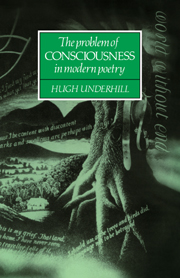
-
Select format
-
- Publisher:
- Cambridge University Press
- Publication date:
- December 2009
- July 1992
- ISBN:
- 9780511519253
- 9780521410335
- 9780521066518
- Dimensions:
- (216 x 138 mm)
- Weight & Pages:
- 0.62kg, 356 Pages
- Dimensions:
- (216 x 140 mm)
- Weight & Pages:
- 0.45kg, 356 Pages
- Subjects:
- Literature, English Literature 1900-1945
You may already have access via personal or institutional login- Subjects:
- Literature, English Literature 1900-1945
Book description
Modernist aesthetics have been identified with a sense of cultural crisis, defined by its distance from an ideal of unified consciousness. This original study of the problem of consciousness in modern poetry examines the struggle towards that ideal of 'unitary' experience, through close readings of British and Irish poets from Hardy and the Georgian poets, through Lawrence, Edward Thomas, Yeats, Eliot, MacNiece and Auden, to Ted Hughes. Underhill argues that while their poetry is both a critique and an expression of crisis, its tendency to emphasize inner states and subjective experience has drawn attention away from the socio-historical dimensions of the problem. Poetry, as contemporary theories of consciousness remind us, is itself a socio-cultural institution and is answerable to outer as well as inner forces. Underhill examines these problems and paradoxes, showing how the impossibility of any stable notion of the unitary in our century can in fact be seen as an opportunity for creative choice and freedom.
Contents
Metrics
Altmetric attention score
Full text views
Full text views help Loading metrics...
Loading metrics...
* Views captured on Cambridge Core between #date#. This data will be updated every 24 hours.
Usage data cannot currently be displayed.
Accessibility standard: Unknown
Why this information is here
This section outlines the accessibility features of this content - including support for screen readers, full keyboard navigation and high-contrast display options. This may not be relevant for you.
Accessibility Information
Accessibility compliance for the PDF of this book is currently unknown and may be updated in the future.


